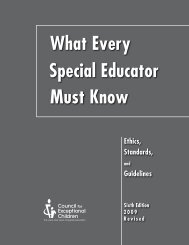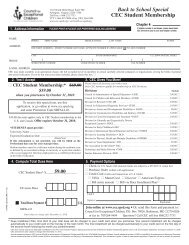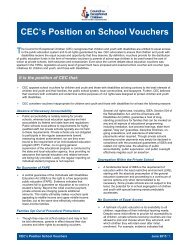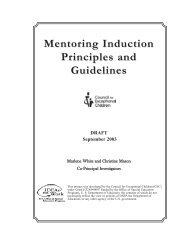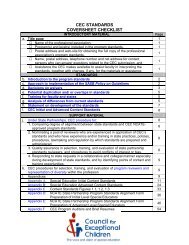CEC Program Reviewer Training - Council for Exceptional Children ...
CEC Program Reviewer Training - Council for Exceptional Children ...
CEC Program Reviewer Training - Council for Exceptional Children ...
Create successful ePaper yourself
Turn your PDF publications into a flip-book with our unique Google optimized e-Paper software.
Initial Content Standard 3. Instructional Strategies & Individualized<br />
Instructional Planning<br />
Special educators possess a repertoire of evidence-based instructional strategies to individualize instruction <strong>for</strong><br />
individuals with exceptionalities. Special educators select, adapt, and use these instructional strategies to promote<br />
positive learning results in general and special curricula and to modify learning environments <strong>for</strong> individuals<br />
with exceptionalities appropriately. They teach literacy and numeracy to individuals with exceptionalities. They<br />
enhance the learning of critical thinking, problem-solving, and per<strong>for</strong>mance skills of individuals with<br />
exceptionalities, and increase their self-awareness, self-management, self-control, self-reliance, and selfesteem.<br />
Moreover, special educators emphasize the development, maintenance, and generalization of knowledge<br />
and skills across environments, settings, and the life span.<br />
Individualized decision-making and instruction are at the center of special education practice. Special educators<br />
develop long-range individualized instructional plans anchored in both general and special education curricula. In<br />
addition, special educators systematically translate these individualized plans into carefully selected shorter-range<br />
goals and objectives taking into consideration an individual’s abilities and needs, the learning environment, and a<br />
myriad of cultural and linguistic factors. Individualized instructional plans emphasize explicit modeling and efficient<br />
guided practice to assure acquisition and fluency through maintenance and generalization. Understanding of<br />
these factors as well as the implications of an individual’s exceptional condition, guides the special educator’s selection,<br />
adaptation, and creation of materials, and the use of powerful instructional variables. Instructional plans are modified<br />
based on ongoing analysis of the individual’s learning progress. Moreover, special educators facilitate this<br />
instructional planning in a collaborative context including the individuals with exceptionalities, families, professional<br />
colleagues, and personnel from other agencies as appropriate. Special educators also develop a variety of<br />
individualized transition plans, such as transitions from preschool to elementary school and from secondary<br />
settings to a variety of postsecondary work and learning contexts. Special educators are com<strong>for</strong>table using<br />
appropriate technologies to support instructional planning and individualized instruction.<br />
Special educators understand typical and atypical language development and the ways in which exceptional<br />
conditions can interact with an individual’s experience with and use of language. Special educators use individualized<br />
strategies to enhance language development and teach communication skills to individuals with exceptionalities.<br />
Special educators are familiar with augmentative and alternative communication systems, and assistive<br />
technologies to support and enhance communication of individuals with exceptional needs. Special educators<br />
match their communication methods to an individual’s language proficiency and cultural and linguistic differences.<br />
Special educators provide effective language models and they use communication strategies and resources to facilitate<br />
understanding of subject matter <strong>for</strong> individuals with exceptionalities whose primary language is not English.<br />
© 2011 <strong>Council</strong> <strong>for</strong> <strong>Exceptional</strong> <strong>Children</strong>. All rights reserved. 32



